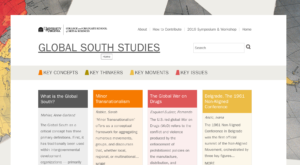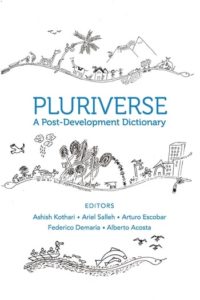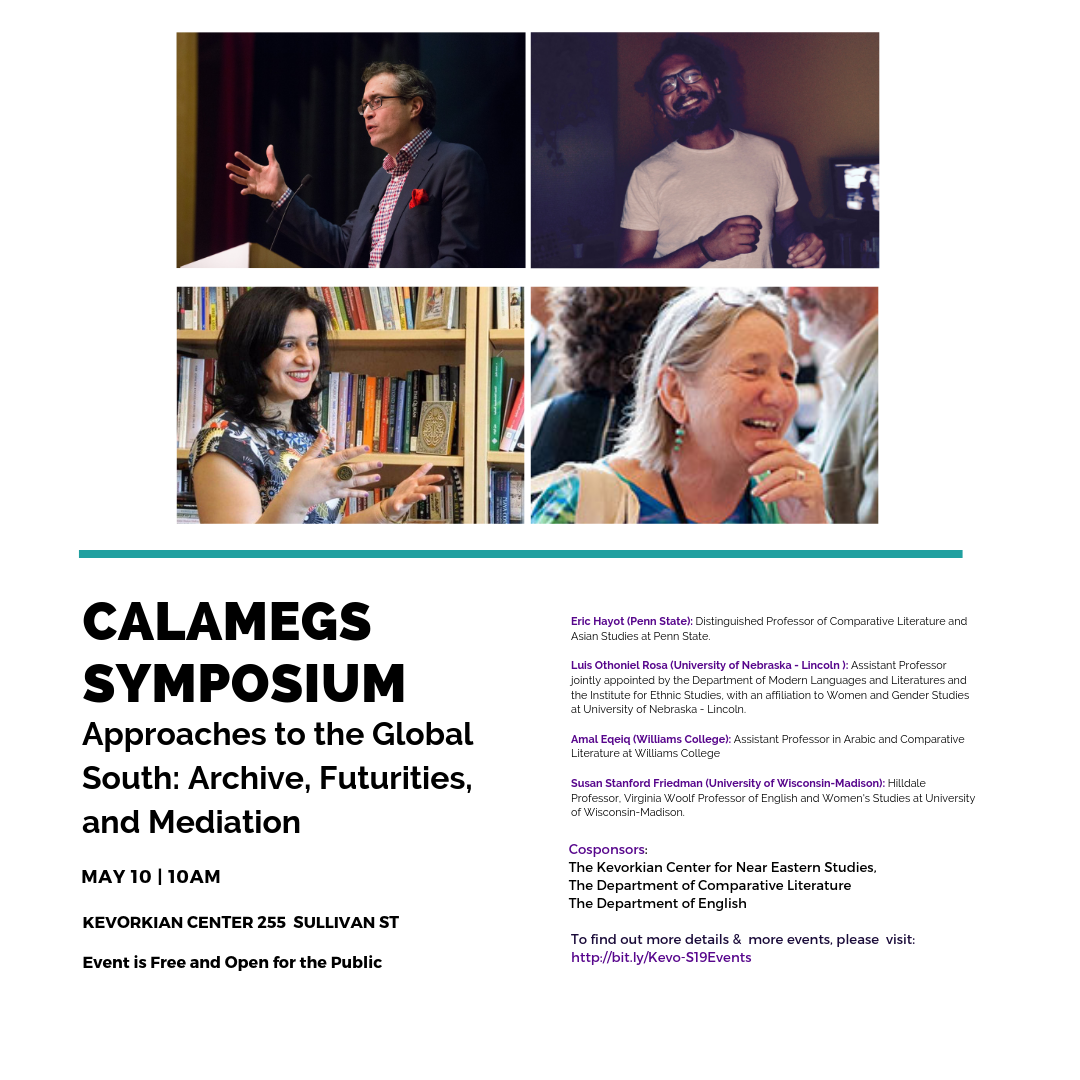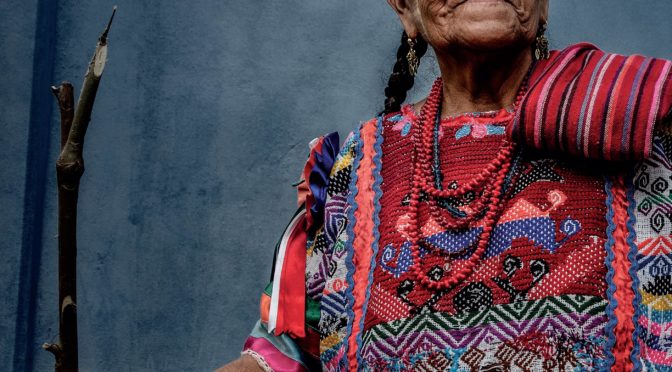Please note the south-south gathering to occur in Morocco on 30 June 2025. Proposals are due 31 December 2024. More info: https://redrisur.com/noticias/
All posts by mzantsi
Global South Studies

This digital platform intends to provide a conceptual mapping of key concepts, moments, thinkers, and issues for the field of Global South Studies and to serve as an online forum for an international and interdisciplinary scholarly community.
Pluriverse now in paper
Pluriv erse: A Post-Development Dictionary contains over one hundred essays on transformative initiatives and alternatives to the currently dominant processes of globalized development, including its structural roots in modernity, capitalism, state domination, and masculinist values. It offers critical essays on mainstream solutions that ‘greenwash’ development and presents radically different worldviews and practices from around the world that point to an ecologically wise and socially just world.
erse: A Post-Development Dictionary contains over one hundred essays on transformative initiatives and alternatives to the currently dominant processes of globalized development, including its structural roots in modernity, capitalism, state domination, and masculinist values. It offers critical essays on mainstream solutions that ‘greenwash’ development and presents radically different worldviews and practices from around the world that point to an ecologically wise and socially just world.
CALAMEGS SYMPOSIUM // Approaches to the Global South: Archives, Futurities, and Mediation
It’s interesting to see how the South helps focus on the politics of knowledge in US academic circles.  Source: CALAMEGS SYMPOSIUM // Approaches to the Global South: Archives, Futurities, and Mediation
Source: CALAMEGS SYMPOSIUM // Approaches to the Global South: Archives, Futurities, and Mediation
Researching South-South Development Cooperation | The Politics of Knowledge Production |
Coming out in July 2019
This interdisciplinary book draws on voices from across the Global South and North to explore the epistemological and related methodological challenges and opportunities associated with researching South-South development cooperation, asking what these trends mean for the politics of knowledge production. Chapters are interspersed with shorter vignettes, which aim to share examples from first-hand participation in and observation of South-South development cooperation initiatives.
The global South is changing how knowledge is made, shared and used
In the past few decades, there’s been more critique of global knowledge inequalities and the global North’s dominance.
News of an important new contribution to southern theory edited by Fran Collyer, João Maia, Raewyn Connell and Robert Morrell.
Source: The global South is changing how knowledge is made, shared and used
On the Pursuit of Good Living in Highland Ecuador: Critical Indigenous Discourses of Sumak Kawsay
This article is a welcome analysis of the different versions of Buen Vivir and the conditions of their emergence in modern Altiplano South America.
Quick, Joe, and James T. Spartz. 2018. “On the Pursuit of Good Living in Highland Ecuador: Critical Indigenous Discourses of Sumak Kawsay.” Latin American Research Review 53 (4): 757–69.
Sumak kawsay, a vision of good living originating in the thought of indigenous intellectuals, has attracted many commentators since its incorporation into Ecuador’s 2008 constitution. But it remains unclear in much of the secondary literature how the discourse of sumak kawsay and its Spanish derivative buen vivir relate to the day-to-day experiences of indigenous people. We address this lack of clarity through a three-part exploration of Kichwa perspectives on the good life. First, we describe how day-to-day discussions are more likely to revolve around the actually existing life of struggle. Then we analyze an artistic genre that illustrates how decolonized indigenous lives might look. Finally, we examine how the decolonial political philosophy of sumak kawsay has emerged out of concerted collective efforts to overcome the life of struggle. We consider how these three instances of discourse relate to a long Andean history of looking to the past for an alternative to the hardships of the present, and conclude with a call to take indigenous perspectives more fully into account when concepts such as sumak kawsay are invoked by nonindigenous actors.
Atlas MEZINAL I
A new database from Oaxaca offers a database of issues across the Indigenous Latin American world.
Source: Atlas MEZINAL I
III Conferencia Diálogo Sur-Sur
III Conferencia Diálogo Sur-Sur
Epistemologías Ancestrales y Decoloniales
Las VII Jornadas El Pensamiento de Rodolfo Kusch y la III Conferencia Diálogos Sur-Sur proponen un espacio en el cual se discuta y reflexione sobre los siguientes ejes: arte; ciencia; tecnología y sociedad; estética; educación; filosofía; psicología; política; movimientos sociales; epistemologías del sur; interculturalidad crítica; pensamiento decolonial; epistemología indígena y ancestral; colonialidad del poder, del saber, económica y del ser; y fagocitación del estar siendo.
Contacto: pensamientoderodolfokusch@untref.edu.ar
Fecha y Lugar
Miércoles 21 de noviembre, de 18:30 a 21:00 hs.
Jueves 22 y viernes 23 de noviembre, de 9:00 a 21:00 hs.
Actividad no arancelada
Sede Caseros II
Valentín Gómez 4752, Caseros
Organizan: Secretaría Académica y Programa Pensamiento Americano
New issue of Garland explores the Zapotec concept of guendalisaà
 Read the latest issue from Mexico here.
Read the latest issue from Mexico here.
The Garland journey now ventures across the Pacific to the region of Oaxaca, legendary for its crafts, festivals and cuisine.
Mexico appeals globally as a culture of colour and celebration, even in death. But what principles underpin this?
For this issue, we’ve been offered the Zapotec concept of Guendalisaà, as the process of “crafting kinship” by making costumes, decorations and installations.
Our quarterly essayist Tessa Laird takes us on her journey to understand the way animals inhabit the creative lives of artisans in southern Mexico, underpinned by the concept of nagual, or animal spirit.
There’s a feast of stories and beautiful objects. Enjoy lives well made!

